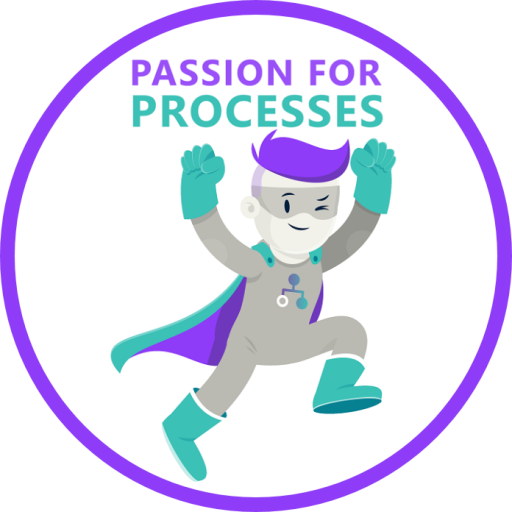

Every once in a while you end up in a conversation where you are thoroughly confronted with the fact that you (and I mean everybody individually) assumes a lot things, you take a lot of things for granted while you have your conversations. You find yourself having a discussion with somebody (a client or a prospect or a friend) and based on one remark you suddenly realize that your assumptions going into the discussion where out of sync with reality.
The topic with which I had exactly this experience was #processmining and in and by itself this not amazing because I spend more than 50% of time talking about process mining. The way I normally build up this conversation is by explaining what I call the big picture (blog #5) where an organization’s strategy and operating model form the basis on which a process and system landscape is being defined and build. Then, once you have translated your processes into work instructions (or SOP’s) you arrive at the EXECUTION level (where it all has to happen).
Only then you can start to think about implementing more tools to either improve your execution capabilities (think about RPA or workflow automation) or to improve your understanding of the level of execution (task mining, IoT or process mining). And yes, all of these mentioned tools can be implemented in a stand-alone fashion, but to my opinion, this will leave you with stand-alone results. When looking for more structural or sustainable results (and thus also ROI), one would do good to consider embedding these tools into a wider process management practice.
So, there I was discussing this topic and all of sudden (I don’t even remember what triggered it) the bomb is dropped: “we don’t document our processes and don’t see the need to do it either”. Fortunately, the addition “but we could be wrong about that” was added rather quickly. My jaw just missed the edge of my desk and by the time I gathered my thoughts again, I decided that I would need to tackle that discussion in a different way. It started asking questions about how they dealt with improvement projects and more specifically the starting point for these projects and the efforts they deployed to make the improvement sustainable.
Soon, it became clear that one the main benefits of working according to process management principles is to reduce the number of time you have to re-invent the wheel!
Without process management (BPM) you often reinvent the wheel on…
- value stream mapping when starting a LSS DMAIC process
- finding out who needs to approve this change to our way of working
- what do we need to train/teach our new employees on?
- what activities are going to be audited because of ISO27K?
- how did we do on our first time right KPI this month?
- why are our business lines all executing this standard process differently?
- why did our RPA bot stop working (it worked last week….before we implemented this new feature on our ERP)?
And the list of course can go on and on.
I am a true believer of the BPM approach, and even if you would be skeptical I still believe there is so much published evidence why a process centric way of working is beneficial for your organization.
So, if you want to implement process mining without doing process management, please go ahead, but don’t be surprised if your results are not sustainable in the long run because you are lacking the foundation on which to embed your mined results.
Having said that… no more blogs for the next 2 weeks…I’ll be enjoying my Christmas holidays and will try not to open up my company laptop ;-)
Happy Holidays and see you in 2021!
Ciao, Caspar
Hi Caspar,
I am a true believer of the BPM approach, and even if you would be skeptical I still believe there is so much published evidence why a process centric way of working is beneficial for your organization
You have to believe because you work in a company that pays for this belief, it is like the Pope of Rome works in Church. I would imagine how it will affect his KPIs if he says that he does not believe )
But, evidence, that is a very interesting topic.
First, most of the evidence is made by who, who is the provider? Mostly, by companies, who asked by the vendor. I would not touch the point that most of those texts/videos clients say are what written by the vendor itself, so that is usually marketing 'white noise'. I would also not touch the point about client motivation to provide this 'evidence', and mostly these are or exaggerations, or they are very far from reality.
The more interesting questions are:
1. For how long this evidence is actual, in time. What I mean - let imagine you would return to your client - reference-provider, let's say in 5 years, how many of them will confirm this 'evidence'? In 10 years?
2. How many companies DO NOT provide evidence because there is nothing to provide. What is the % of not-success BPM initiatives? Also very interesting )
Best regards,
Alex
Hi Alex, thank you for your interesting comments. I think we need to make a distinction between what you read in marketing material (no offense to my great colleagues in Marketing by the way) and what is available at BPM vendors. My blogs are always purely personal and my personal experience is that I have been leading a BPM CoE for a global manufacturing company for a number of years and because of that have had the opportunity to think about the benefits of BPM a lot...
The difficulty with BPM benefits is that they are most often interwoven with other benefits and are difficult to isolate (and therefor communicate). Nevertheless, based on the realized benefits at a number of our customers, we have been able to set up a directory of BPM benefits, which can even be correlated with the bottom line financial KPI's of a company. In other words, based on the size of a company in terms of EBITDA and staff (fte's) we can have a pretty good idea of the potential benefits (of course, they then need to be scaled to proportion and validated in the end), it would be a good guestimate.
regards,
Caspar














